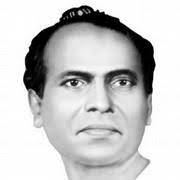Tukaram Bhaurao Sathe (1 August 1920 – 18 July 1969), popularly known as Annabhau Sathe, was a social reformer, communist folk poet, and writer from Maharashtra, India. Sathe was a Dalit born into the untouchable Mang community, and his upbringing and identity were central to his writing and political activism. Sathe was a Marxist-Ambedkarite mosaic, initially influenced by the communists but he later became an Ambedkarite. He is credited as a founding father of 'Dalit Literature'. Writings Sathe wrote 35 novels in the Marathi language. They include Fakira (1959), which is in its 19th edition and received a state government award in 1961. It is an interesting novel which tells the story of the protagonist; the stout young guy, named Fakira, his feat, his crusading for the rights of people of his community in the British regime (India) and his enmity towards the evil forces in the village. However, the cause from where the story progresses is the religious practice or ritual called 'Jogin' which gives a way to further actions. There are 15 collections of Sathe's short stories, of which a large number have been translated into many Indian and as many as 27 non-Indian languages. Besides novels and short stories, Sathe wrote a play, a travelogue on Russia, 12 screenplays, and 10 ballads in the Marathi powada style. Sathe's use of folkloric narrative styles like powada and lavani helped popularise and make his work accessible to many communities. In Fakira, Sathe portrays Fakira, the protagonist, revolting against the rural orthodox system and British Raj to save his community from utter starvation. The protagonist and his community are subsequently arrested and tortured by British officers, and Fakira is eventually killed by hanging. The urban environment of Bombay significantly influenced his writings, which depict it as a dystopian milieu. Aarti Wani describes two of his songs – "Mumbai Chi Lavani" (Song of Bombay) and "Mumbai cha Girni kamgar" (Bombay's Mill-hand) – as depicting a city that is "rapacious, exploitative, unequal and unjust".
NaN
